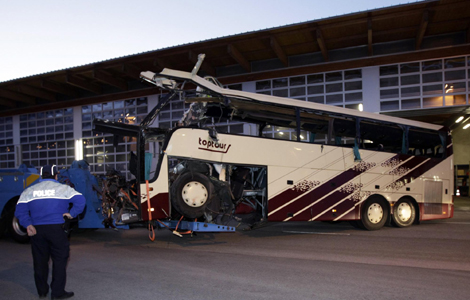 |
|
|
|
|||||||||||
Company founders face problems passing control to next generation
The founders of family-owned businesses in China are facing growing difficulty in passing on the baton to their offspring, with the majority of founders of companies expected to have problems finding suitable successors in the coming decade, a study shows.
The research, conducted by Shanghai Jiaotong University, found that only 18 percent of fuerdai - the Chinese term for children born to rich families - are willing to take the helm of their family-run businesses.
 |
The result was based on an analysis of over 180 family-owned enterprises that are in the leading position in their respective industries.
"The average age of these enterprises' founders is 52. That is to say, over the next 10 years, these enterprises will face succession issues," Yu Mingyang, professor of the China Enterprise Development Institute of Shanghai Jiaotong University, said at a forum on Wednesday.
Unlike their parents, the younger generation have different characteristics. According to Yu, most of them had an overseas education background and have always had a comfortable life.
The succession issue aroused concerns during the annual session of the National People's Congress and the Chinese People's Political Consultative Conference.
Sammy W.S. Lee, a member of the national committee of the CPPCC, as well as chairman of Hong Kong-based company Lee Kum Kee, suggested the government should attach more importance to succession issues at family businesses.
"Most first-generation entrepreneurs in China, mostly in their 50s and due to retire in their 60s, will pass on the baton in five to 10 years to their children, who are expected to build on their success," said Lee, whose sauce business was started in 1888 by his great-grandfather.
Nan Dianle, a steel business owner in North China's Hebei province, has had to pin all her hopes on her younger son to take over the family business.
"My older son, now 21, simply shows no interest in business matters," the 40-year-old entrepreneur said.
Originally from Wenzhou, the cradle of the country's booming small and medium-sized enterprises, Nan and her husband Chen Debin moved to Tangshan, an inland manufacturing hub, two decades ago.
Their business acumen and hard work transformed the family-owned workshop with 10 people to a local powerhouse that employs around 600 staff. But it has always been a headache for the couple that their older son long positioned himself as a "poet", rather than an "entrepreneur".
After years of entrepreneurship, Nan and Chen look forward to the day when they retire, secure in the knowledge that their business is safe for another generation. So Nan had to devote all her energy to cultivating her other son, who is just 11, to be business savvy.
But 26-year-old Guan Yanqin, from Meishan, Sichuan province, opted to take over the running of her father's pickle-making business.
"I grew up in the plant and saw my parents were busy night and day. Their spirit certainly inspired me. I want them to fully enjoy the fortune they made from their hardship after retirement," Guan said.
In order to manage the two companies under her father's group, Guan chose to study mathematics and business administration in the United Kingdom. Instead of joining her father's company right after graduation, she spent six months in Beijing working at an accounting firm.
Now, as a board member, Guan oversees the company's financial affairs.
Currently, there are more than 8.4 million family-owned businesses nationwide, accounting for 87.4 percent of all company types, according to a poll conducted by business portal hexun.com and consultancy DATA100. These businesses contributed 60 percent to the country's gross domestic product.
Zhou Dewen, chairman of the Wenzhou Small and Medium-sized Enterprise Development Association, said: "Some company heads simply don't want their children to undergo the hardships they had. In other cases, it is the second generation who want to run their own lives and to be true to their own values."
And these fuerdai do not necessarily lack compassion or ambition, Zhou added.
"The young generation have less interest in the real economy, but turn to areas like investment and other virtual economies," Yu from Jiaotong University said.
Zhou said the uncertain economic situation may have deterred some young entrepreneurs, as most of China's family-run SMEs are engaged in manufacturing and the wholesale and retail trade, which relies heavily on the performance of key global economies.
According to the Chinese Family Business Report in 2011, only 7.9 percent of company heads interviewed were willing to hire professional managers, with 55.9 percent complaining about the difficulty in finding suitable candidates and 34.6 percent citing the high cost.
Zhao Zi, secretary of the National Center for Private Economy Studies, said: "It's urgent we come up with a platform for family businesses to share experiences to ensure the smooth transition."
Wu Ying, iPad, Jeremy Lin, Valentine's Day, Real Name, Whitney Houston, Syria,Iranian issue, Sanyan tourism, Giving birth in Hong Kong, Cadmium spill, housing policy

|

|

|

|

|

|